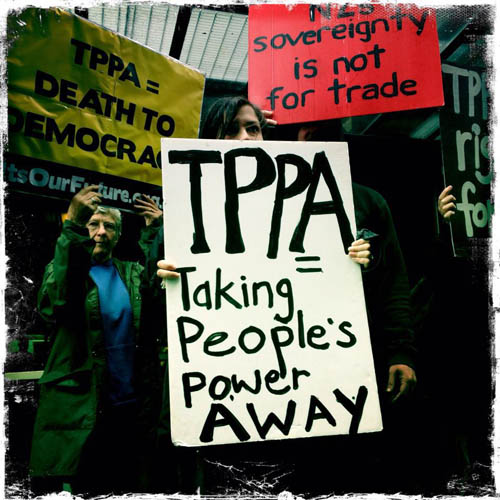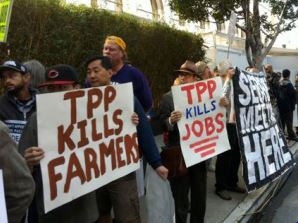
Logan and Albert Conservation Association

Ratifying the TPP with ISDS inclusions will not be in Australia’s national interest......
4 days left to HAVE YOUR SAY ie make a submission to the Senate sub-committee due this Friday 11 March 2016.
A Senate committee is about to assess whether the TPP, Trans Pacific Partnership, as it stands, is ‘in the national interest’. The Turnbull Government will then put forward legislation to ‘ratify’ the TPP. If this is then approved by a majority in the Senate, Australia will be stuck with this agreement for longer than most of our lifetimes.
Submissions can be emailed directly to This email address is being protected from spambots. You need JavaScript enabled to view it.. Submissions are ultimately all about numbers.
LACA believes this "FREE TRADE" agreement is the most dangerous and immediate threat to our capacity to protect the environment from climate change, and future bad development decisions. With its toxic Investor-State Dispute Settlement (ISDS) provision in the Trans Pacific Partnership agreement our country's ability to make decisions can be challenged by a corporation and go to trial at an offshore international tribunal.
In order to assist you LACA has a prepared a question and answer backgrounder for those not familiar with this issue. Read it here ![]() TransPacificPartnership_QuestionandAnswer.docx
TransPacificPartnership_QuestionandAnswer.docx
Brief one page summary submission for a quick cut and paste and send today ![]() TPP-ISDS_Submission-brief.docx
TPP-ISDS_Submission-brief.docx
There is also a longer more detailed document if you prefer ![]() TPP_Submission-to-JSCOT.docx
TPP_Submission-to-JSCOT.docx
Please send your submission to the Senate Committee before this coming Friday 11 March, letting the Senate committee know that you do not see the TPP with ISDS inclusions as even remotely ‘in Australia’s national interest’.
HAVE YOUR SAY on this critically important matter.
Submissions can be emailed directly to This email address is being protected from spambots. You need JavaScript enabled to view it.
LACA has been writing about this issue for several years. If you are new to the issue search for TPP in the search function of thsi website.
In addition EDO provides some useful links at http://www.edoqld.org.au/news/have-your-say-on-the-tpp/
Do we want a pro-fossil-fuel, anti-environmental Abbott-type government in office - permanently?
ISDS threats / agreements are currently part of TPP or TPPA Trans Pacific Partnership Agreement
Richard Ackland’s article in last weekend's 'The Saturday Paper' sums up the ISDS / Investor-State Dispute Settlement threat perfectly:
‘So here we have a potential for environmental protections to be struck down, and where the consequences would be to create a chilling effect on governments that contemplate the introduction of new laws and regulations in this area. It would be like having a pro-fossil-fuel, anti-environmental Abbott-type government permanently in office’
https://www.thesaturdaypaper.com.au/opinion/topic/2016/02/13/trans-pacific-partnership-stall-climate-change-action/14552820002886
There remains a vital window of opportunity for us to press for the removal of ISDS provisions in the TPP: while the TPP agreement has now been accepted by Australia and the 11 other nations involved, it has not yet been ratified through parliament. This is expected to occur over the first half of this year. Labor and the Greens do not support ISDS in free trade agreements, but Labor may support the passing of TPP legislation including ISDS if there is not enough public outcry.
So building community awareness and lobbying Labor members and the Senate is crucial now.
Need to know more?
See the attached question and answer guide to knowing more about how ISDS in free trade deals will impact on our future capacity to protect unique Australian environment .
![]() TransPacificPartnershipQuestionandAnswer.docx18/02/2016, 13:33
TransPacificPartnershipQuestionandAnswer.docx18/02/2016, 13:33
Contact Barry Fitzpatrick (LACA ISDS campaign leader) 0427002640
Last question in Q and A document: What can I do to stop the Turnbull Government from ratifying the TPP with ISDS?
A: Write to your local federal member and senators, objecting to the inclusion of ISDS in the TPP.
Urge them to support you in seeking a re-negotiation of the TPP without ISDS.
Write to each of the members of the Joint Standing Committee on Treaties http://www.aph.gov.au/jsct which will be providing a final report on the TPP before the Turnbull Government moves to ratify the agreement.
Above all, let as many people as you can know about the threat that ISDS poses not only to our future environmental regulations
but also social, health and internet regulations.
The Treaties Committee is empowered by its resolution of appointment to inquire into and report on 'matters arising from treaties and related National Interest Analysis and proposed treaty actions presented or deemed to be presented to the Parliament.' The Committee invites interested persons and organisations to make submissions for the the Trans-Pacific Partnership Agreement (TPP) by Friday, 11 March 2016. Submissions for this inquiry can be lodged online via the link on this page. For information on how to make a submission, go to our Making a submission to a Parliamentary Inquiry page.
Membership of Treaties Committee can be found here.
Trans Pacific Partnership Q and A
Q: What is the TPP?
A: ‘TPP’ stands for the Trans Pacific Partnership – a so-called free trade deal between 12 nations rimming the Pacific Ocean. It is really more about entrenching multinational corporate power than free trade, with only six out of the thirty negotiation chapters in the treaty having anything to do with trade. The signatory nations are Australia, US, Canada, New Zealand, Vietnam, Singapore, Malaysia, Brunei, Chile, Peru, Japan, and Mexico. It is the biggest ‘free trade’ deal in history. Australia still needs to ratify its agreement through possible legislative changes, and this is likely to happen in February 2016, if these changes are passed by the Senate. The TPP contains ISDS (corporate powers to sue in offshore tribunals), allowing multinationals to bypass our legal system and sue Australia, offshore in a foreign tribunal, if they believe at any time that our environmental and other public interest laws are impacting their profits here.
Q: Will the TPP benefit Australia economically?
A: There is great doubt around this. The TPP is often described as not about trade but about enforcing the rights of multinational corporations to over-rule democratic governments, their citizens and communities. Australia’s Productivity Commission – established to give independent advice to the Government on economic matters - as recently as June 2015 was deeply critical of Australia's latest series of free trade agreements, saying they ‘grant legal rights to foreign investors not available to Australians, expose the government to potentially large unfunded liabilities and add extra costs on businesses attempting to comply with them’.
Under the TPP, some tariff changes for Australian agriculture exporters will be slowly lowered in stages over years, but on the negative side, for example, labelling of national origin of foods is very likely to be prohibited, impacting on local producers and retailers who currently proudly promote their products on the basis of ‘made in Australia.’ The Philippines may in the future join the TPP, meaning that our banana industry could face disease threats.
Trade policies are contentious because they are approximately zero-sum games. There are domestic winners and losers, and although the national welfare gain is not zero, it is usually small. Unlike a good health or social policy, which can make everyone a winner, a trade policy tends to pit the interests of one part of the community against those of another
Q: What is ISDS?
The Coalition has made a pre-election commitment to 'fast track' pending international free trade deals by doing what the current Labor Government has stubbornly refused to do: accept dangerous legal provisions which will allow transnational corporations to sue Australia in off-shore tribunals - away from our own legal system - if our environmental and other public interest regulations get in the way of their profits.
If the Coalition is elected and pushes ahead with this commitment, we will almost certainly see the death of environmental campaigning as we know it in this country, along with significant weakening of environmental regulation.
The Trans Pacific Partnership Agreement (TPPA) is a huge free trade deal due to be signed off by Australia in October this year, and comes fully armed with corporate powers to sue participating nations in off-shore tribunals, known as Investor-State Dispute Settlement (ISDS) provisions.
 Under earlier free trade deals, including the North American Free Trade Agreement (NAFTA – the model for the TPPA), corporations like Chevron, Exxon Mobil, Dow Chemical, and Cargill had, by 2011, launched 450 investor-state cases in off-shore tribunals against 89 governments to fight environmental laws and regulations, including
Under earlier free trade deals, including the North American Free Trade Agreement (NAFTA – the model for the TPPA), corporations like Chevron, Exxon Mobil, Dow Chemical, and Cargill had, by 2011, launched 450 investor-state cases in off-shore tribunals against 89 governments to fight environmental laws and regulations, including
challenges to bans on toxic chemicals, fracking, timber, mining regulations and programs
supporting green jobs and renewable energy.
Recent examples include the US Lone Star Mining company currently using ISDS provisions in NAFTA to sue the Canadian Quebec provincial government because it has suspended coal seam gas fracking pending a study of its environmental impact, and Peru, which has recently been required to pay Renco the largest ever damages award of USD$ 4.2 billion for banning products that had contaminated the city of La Oroya's environment and poisoned 95% of children there.
There are many, many more examples.
The threats posed by ISDS provisions in free trade agreements clearly impose a 'regulatory chill' effect on nations wanting to avoid the ongoing costs of defending their public interest regulations in off-shore tribunals away from their own jurisdictions.
Couldn't happen here?
The Trans Pacific Partnership – a massive new free trade agreement where your vote may no longer count as a way of stopping unwanted CSG, coal mining, deep sea mining and other impacts by transnational corporations
Who would want an Australia in which major transnational corporations can sue the Australian government in off-shore tribunals – away from our legal system and democratic process - for making laws which are aimed at protecting water quality, environment and farmland from inappropriate CSG and coal operations?
Who would want Australia to sign an international free trade agreement which could potentially wreck our Pharmaceutical Benefits Scheme, severely restrict our free use of the Internet and curtail our democratic rights?
Jane Kelsey, Professor of Law at Auckland University, has said: 'This locks the door on electoral democracy'.
It appears that, if elected to government, the Federal Coalition may be willing to go along with this.
The Trans Pacific Partnership Agreement (TPPA) is a massive free trade agreement currently under negotiation in high secrecy between Pacific Rim nations including Australia, Brunei, Chile, Singapore, Malaysia, New Zealand, Peru, the US, Vietnam, Canada and Mexico. Other nations, including Japan and possibly China, are set to join.
The TPPA includes provisions which, if agreed to by signatory nations, will give extraordinary powers to transnational corporations through Investor-State Dispute Settlement (ISDS) provisions. At the least level, these will put a 'chilling effect' on governments introducing new regulation around environment etc.
Fortunately the current Australian Government has steadfastly refused to agree to the inclusion in free trade agreements of ISDS provisions, in spite of great pressure from the US, transnational corporations and some sections of Australian industry.
However, the Federal Opposition has sent a clear message that, if elected, it will be willing to agree to investor state dispute settlement provisions in trade agreements in order to conclude a deal.
The Trans-Pacific Partnership Agreement:
Potentially the greatest threat yet to our environment,
social justice, health system and democracy
This could represent an unstoppable threat to our environmental laws, our way of life, our democratic rights, our legal system, our health system, our internet use, our tobacco plain packaging laws, etc, etc. If certain provisions in this trade deal, currently being negotiated in extreme secrecy, are agreed to by a future Coalition Government then Australian communities will have little power to stop any foreign corporation from doing what it wants, where it wants, including moving them out of the way, if necessary. This is a real concern because these clauses, known as 'Investor-State Dispute Settlement' provisions, fit comfortably within increasingly right wing Coalition ideologies under Tony Abbott.
Do you want an Australia in which major international Corporations can sue the Australian government for making laws which are aimed at protecting farmland, water quality, rainforests, the Great Barrier Reef etc?

What is it?
This is the Trans pacific Partnership Agreement (TPPA) – free trade negotiations currently being held in high secrecy between Australia, Brunei, Chile, Singapore, Malaysia, New Zealand, Peru, the US, Vietnam, Canada and Mexico. Other nations, including Japan and possibly China, are set to join. The negotiations have been going on for a number of years but the agreement is proposed to be signed off soon – possibly in October this year. An excellent summary of the environmental and other issues that may flow from this trade agreement can be found in:
http://www.citizenstrade.org/ctc/wp-content/uploads/2012/03/TransPacificEnvironment.pdf and http://www.citizenstrade.org/ctc/wp-content/uploads/2012/03/TransPacificCorporations.pdf
Or you can search the archives here